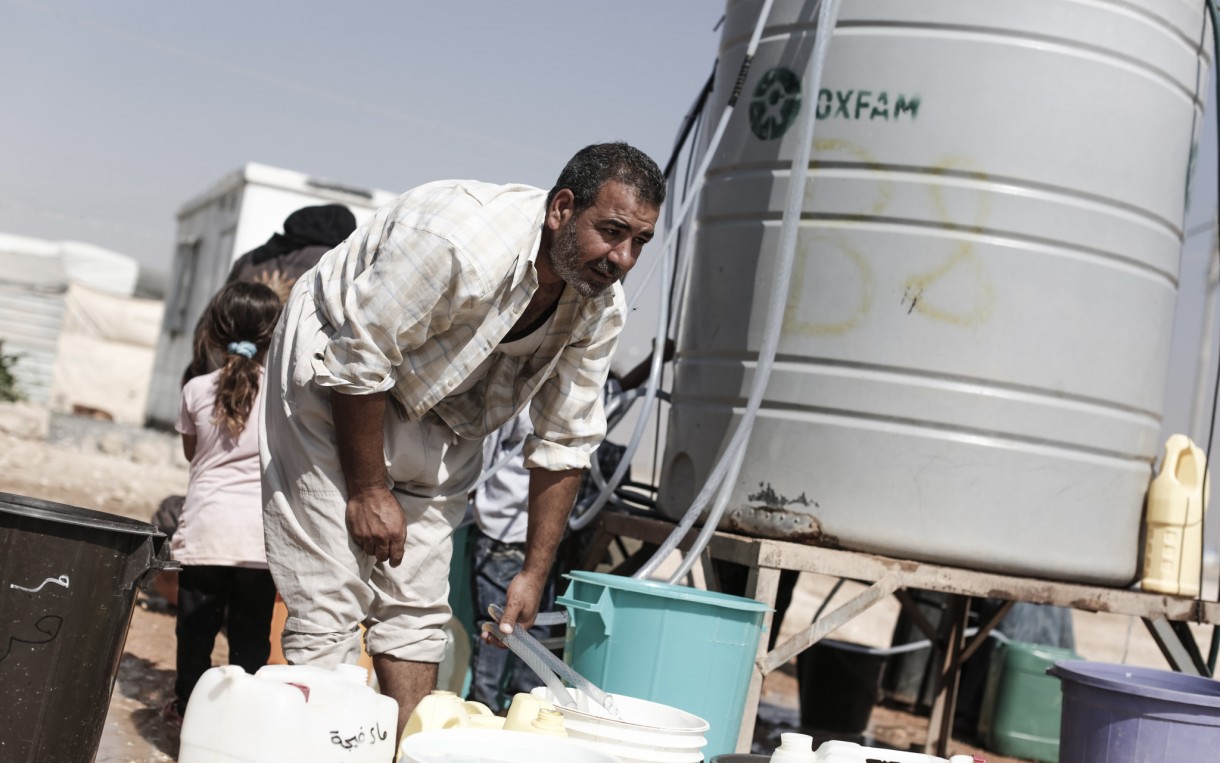“We regret to inform you that we must close your account”
 Ahmad, 39, from Ghouta, near Damascus in Syria, collects drinking water from an Oxfam supplied water tank in Zaatari camp in Jordan, which is home to around 80,000 Syrian refugees. Half of the camp's residents are under 18. Oxfam helps some 25,000 of Zaatari's residents by providing drinking water, toilets and showers, community centres, hygiene promotion and waste collection. Although important local programs like these exist, many displaced Syrians are dependent on families abroad for financial support. Photo: Sam Tarling/Oxfam
Ahmad, 39, from Ghouta, near Damascus in Syria, collects drinking water from an Oxfam supplied water tank in Zaatari camp in Jordan, which is home to around 80,000 Syrian refugees. Half of the camp's residents are under 18. Oxfam helps some 25,000 of Zaatari's residents by providing drinking water, toilets and showers, community centres, hygiene promotion and waste collection. Although important local programs like these exist, many displaced Syrians are dependent on families abroad for financial support. Photo: Sam Tarling/Oxfam
What is bank de-risking and how does it affect the poor?
Scott Paul is a Senior Humanitarian Policy Advisor at Oxfam America.
A few years ago, some small remittance companies told Oxfam that banks were closing their accounts without any explanation. The companies pleaded with the banks to let them keep their accounts, or at least to understand what they did wrong. They did nothing wrong, the banks told them. But the accounts would have to be closed anyway. This was our introduction to bank de-risking, the trend of banks’ ending relationships with whole categories of clients perceived as “high-risk.”
Once we became aware of the de-risking phenomenon, we began to see and learn about similar problems in other aspects of our work. We heard from other remittance companies and foreign embassies that struggled to maintain accounts. We learned of the difficulties that other charities- particularly diaspora charities and small humanitarian organizations, were having in trying to access the financial system. And we realized that correspondent banking – the web of inter-bank relationships that enables money wiring and trade finance – was taking a serious hit. It wasn’t long before we connected the dots between these problems and the challenges that we and other organizations face in transferring money to our field offices that are leading humanitarian response efforts – challenges that endanger millions of people in need of assistance, as well as our own staff.
De-risking is the subject of Oxfam’s new research report conducted together with the Global Center for Cooperative Security. The paper concludes that de-risking is driven by a complex set of interrelated factors, including perceived or assessed client risk; client profitability; compliance costs and pressures; fines and penalties; reputational and legal concerns; and an overall shift from corporate to individual liability. Put more simply, the increasing costs and risks of serving certain types of clients are greater than the revenue these clients can generate for banks. Even though regulations call for banks to assess the risk of each client individually and make clear that even high-risk clients may be served with proper due diligence, banks are finding it easier to cut and run from small, high-risk clients.
The de-risking trend also poses a major obstacle to financial inclusion efforts worldwide. As well as hurting remittance companies – often the only providers of financial services when banks are absent – de-risking threatens to crowd out innovative mechanisms to offer financial services to the unbanked poor. These platforms, many of them cashless or mobile phone-based, need bank accounts, and banks often find navigating them more trouble than they’re worth. In order to overcome the obstacle that financial exclusion presents to development, governments and donors are going to need to engage deeply with the financial sector and its disengagement from alternative financial services providers.
Though banks should make individualized assessments of the risks their clients present, governments are primarily responsible for turning the tide of de-risking. The declining risk appetites of banks are largely tied to enforcement, prosecution, regulation, and a general political climate that discourages serving clients perceived as high risk and dealing with high-risk jurisdictions generally, while offering little to no incentive to serve clients that are providing valuable services to poor, vulnerable, and financially excluded populations. Ironically, as high-risk clients lose their accounts with major banks, they turn to smaller banks with less capacity to manage risk and other less regulated channels –increasing the total amount of risk in the global financial system.
Until recently, the response of governments has been muted. Last year, the Financial Action Task Force, an intergovernmental body mandated to set standards for financial regulation, expressed concern about de-risking and launched an effort to collect better data on its drivers and effects. The US Treasury Department had until recently neglected to address de-risking head on, but a November 16 speech by Acting Under Secretary of the Treasury Adam Szubin demonstrates a more serious consideration of the topic. However, Treasury’s insistence that its approach is effective – amidst numerous signs that its implementation of the risk-based approach is a chief driver of de-risking – is problematic. Rather than stay the course or abandon the risk-based approach entirely – particularly given the need for government to curb abuses and crime in the financial sector – we recommend a more carefully calibrated risk-based approach to blunt de-risking’s effects on poor and vulnerable communities.
Oxfam’s greatest concern is that de-risking will result in reduced remittance flows, more costly and complex humanitarian action, and, indirectly, reduced trade finance, business activity, and availability of financial services in developing countries. With input from individuals in the banking sector, government, affected segments of the client base, our research demonstrates that this concern is well-founded – though, to be sure, more comprehensive data are required to confirm the extent of the current and prospective impact.